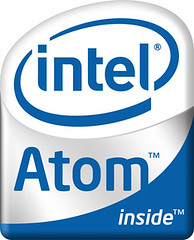Thanks to NetbookNews I watched this interesting interview between Xavier from Notebooks.com and Rahul Sood, the founder of VoodooPC and currently the CTO of Voodoo at HP…
Rahul has written a great post which led to the interview on his blog and I definitely recommend you read that as well for a very insider perspective on netbooks and Intel’s Atom.
While listening to the interview and reading Rahul’s post I’ve considered my own experiences with the Samsung NC10
and I would have to agree with the general assessment here. Netbooks are killer machines, but they are also limited in what they can really do well. As long as you understand how they really work, you’ve got a very capable system in your hands.
As Rahul points out, the confusion with Netbooks started with how they came to be. Initially designed for the lower end and emerging markets, they quickly found greater success as supplementary systems in more developed markets due to lower costs and pretty solid specs. What’s happening now is a fairly vast commoditization of systems. Looking at the spectrum of netbook news as I’ve been since becoming interested in the category, the specs across the board are essentially the same. The main differences tend to be based on size and how much standard RAM, HD and whether you get a 3 or 6-cell a battery. Just about every brand is using the same 1.6Ghz Intel Atom chip running Windows XP. Aside from a few players the category is pretty vanilla.
The more I’ve used and enjoyed my netbook, the more annoyed I also get with things like flash video stuttering or that I can move faster in google reader than Firefox seems to want to go. I know I bought a “cheap” system but because I’m running standard operating systems and applications it’s easy to forget … The danger here is that the we see a crossover in the types of products in which Atom gets used and as we go bigger, the worse the result.
I’m far from sold on new operating systems or start up modes for netbooks as interesting as Jolicloud does look. Instead I’m sold on the longer battery life, ultra light and mobile systems we currently call netbooks. I hope we see innovative ways to bring the power but keep the size – just like the good old days of Moore’s Law! Now that I’ve experienced the potential power of ultra mobile computing I just want more … absolutely not less. I don’t think netbooks are bad for the industry. Sure these are interesting financial times, but look at how many people are talking about and more importantly buying these PCs. So Rahul, if you are thinking of a Voodoo machine in the 10″ range with at least 6 hours of battery life (though perhaps not a netbook), I’m definitely interested.


There are two ways for the netbook business to go:
1) Be a lower tier of the laptop industry — keep on a power & feature growth path, at a fixed price, just like the rest of the laptop industry, but be positioned at a tier below the “notebook” (lower price, lower performance, etc.).
2) Drive price downwards, with fairly constant power & features.
Clearly 1) is the strategy any existing computer manufacturer will want to adopt. It has worked for many years and it applies perfectly well to the netbook tier.
It seems that you are keen on this strategy. And there is nothing wrong with that.
However, I would like to see some players go after strategy 2: make the netbook cheap enough that I can have several sitting around the house, leave them in places I often visit, etc. Make them small/light enough that I throw it in my bag whenever I go anywhere (and I don't worry about it getting broken, lost, stolen any more than I worry about my watch).
This is not appealing to the big computer manufacturers but is likely to appeal to the same people who make other low-cost electronics.
I hope they don't become disposable though I suppose there's a market for that. I would really like to see more power in the smaller package. For me having a very robust system that can do most anything I need is a very powerful concept and something I get a lot of value from.
There are two ways for the netbook business to go:
1) Be a lower tier of the laptop industry — keep on a power & feature growth path, at a fixed price, just like the rest of the laptop industry, but be positioned at a tier below the “notebook” (lower price, lower performance, etc.).
2) Drive price downwards, with fairly constant power & features.
Clearly 1) is the strategy any existing computer manufacturer will want to adopt. It has worked for many years and it applies perfectly well to the netbook tier.
It seems that you are keen on this strategy. And there is nothing wrong with that.
However, I would like to see some players go after strategy 2: make the netbook cheap enough that I can have several sitting around the house, leave them in places I often visit, etc. Make them small/light enough that I throw it in my bag whenever I go anywhere (and I don't worry about it getting broken, lost, stolen any more than I worry about my watch).
This is not appealing to the big computer manufacturers but is likely to appeal to the same people who make other low-cost electronics.
I hope they don't become disposable though I suppose there's a market for that. I would really like to see more power in the smaller package. For me having a very robust system that can do most anything I need is a very powerful concept and something I get a lot of value from.